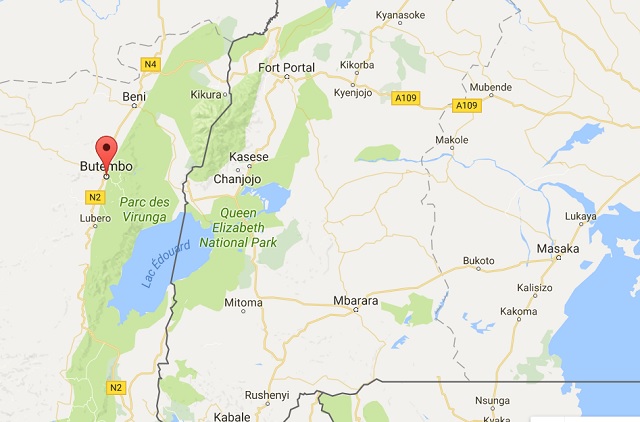
Butembo, DR Congo | AFP |
The question is so absurd that Butembo’s deputy mayor misses a beat before answering.
What is the town’s unemployment rate?
“Unemployment is the norm around these parts,” says Godefroid Kambere Matimbya. “There aren’t any businesses.”
Butembo is no ghost town, but a city of 1.1 million in Democratic Republic of Congo’s restive North Kivu province. Fabled for its natural riches, the lush east of the country abounds in forests, lakes, farmland and mineral-packed peaks. For many, its wealth is its curse.
“Nothing has gone right for the past 10 years or so” in Butembo, Kambere says.
In fact, for the past two decades rival armies and insurgents have ripped through North Kivu, fighting each other, stealing resources, uprooting and killing civilians in their wake.
Butembo — “the city of ficus trees” in Kinande, the language of the local Nande ethnic group — was once known for its coffee farming and a cornucopia of worldly goods.
Electrical appliances, clothing, shoes: the coveted foreign items used to draw shopkeepers from neighbouring provinces in one of the world’s least developed countries.
Today it would be too dangerous for traders to travel the roads to Butembo.
Butembo also once boasted an industrial-scale factory, the Cobeki soft drinks maker.
But it went out of business in the transitional period between DR Congo’s second civil war (1998-2003) and its 2006 elections.
Living ‘by the grace of God’
The period that followed, in the wake of President Joseph Kabila’s election, has not treated the region any better.
Around 700 people have been killed, mostly hacked to death, in attacks since October 2014 around Beni, its neighbouring city to the north.
Beni, now a shell of a city, no longer buys Butembo’s goods.
“The people have been run out of the fields, and now must live by the grace of God,” Kambere says.
“Insecurity is the big problem,” says Butembo’s Polycarpe Ndivito Kikwaya, president of the local branch of the Congolese Business Federation.
Foreign goods do still make it to Butembo although only in “very, very small” numbers, shipped to the Kenyan port of Mombasa and then transported via Uganda.
But with the insecurity, “buyers no longer come since they are afraid of being robbed” along the way, he explains.
Strangely, it is the period of civil war from the late 1990s that fires up economic nostalgia.
Butembo then was the stomping ground of the RCD/K-ML, a militia group backed by neighbouring Uganda.
“Business was good,” recalls Elie Kwiravusa, a member of Butembo’s Civil Society Coordination grouping of local citizens.
“During the rebellion, we could trade goods,” he says. “The rebellion was profitable for people” — unlike today, he adds.
Soap by the centimetre
The Crystal soap factory has, for now, defied its fate.
In 2013, hoping for a brighter future, its owners installed two giant vats to hold palm oil, the main ingredient in the soap, but they have never been filled.
Crystal continues to make soap but in ever-smaller quantities for ever-smaller purchases.
“Our customers are poor people whose situation is getting harder and harder,” says manager Kahiwa Kahongya, who admits that keeping the business running is a struggle.
At the market, soap bars are measured out and priced by the centimetre, the bits used to wash everything from dishes to clothes and bodies.
In the city centre, the much-vaunted “Revolution of Modernity” promised by Kabila has left only a faint trace: two asphalted roads in a grid of brick-red mud lanes, one named after Kabila himself, another after provincial governor Julien-Paluku.
Still, Butembo lacks safe water to drink, and electricity. And to run its soap-making business, Crystal uses a steam machine as in olden days, fired up with a wood-burning furnace.
A priest who prefers not to give his name says that even after a lifetime of luckless hardship, “frustration” is growing among locals.
If civil war gave Butembo a shot at trade and commerce, and the democratic process brought insecurity and economic defeat, it is hardly surprising that the Bubolese — the city residents — look warily upon the next round of elections.
Graduate taxi drivers
Kabila has ruled since 2001, and under the constitution is barred from running for a third term. His current term was due to end on December 20.
On Thursday he named opposition lawmaker Samy Badibanga as the next prime minister in a back-room power-sharing deal with fringe parties that effectively extends his term to late 2017 at the least.
Meanwhile, millions of lives in Congo’s east hang in the balance, following the power grabs of a few, in one of the most naturally plentiful regions of the former Belgian colony.
One outcrop of stability sits in a leafy enclave overlooking Butembo: the Catholic University of Graben. Here its 1,500 students prosper under the protection of the Roman Catholic Church, which in North Kivu as elsewhere in the country remains a powerful influence.
Yet even their high-quality education cannot shield them from a future which lies in wait beyond the school boundaries.
“There’s just no work,” says one student manager. “So graduates just make do.
“You get a degree in economics? You become a taxi driver. You get a law degree? You become a taxi driver.”
 The Independent Uganda: You get the Truth we Pay the Price
The Independent Uganda: You get the Truth we Pay the Price



